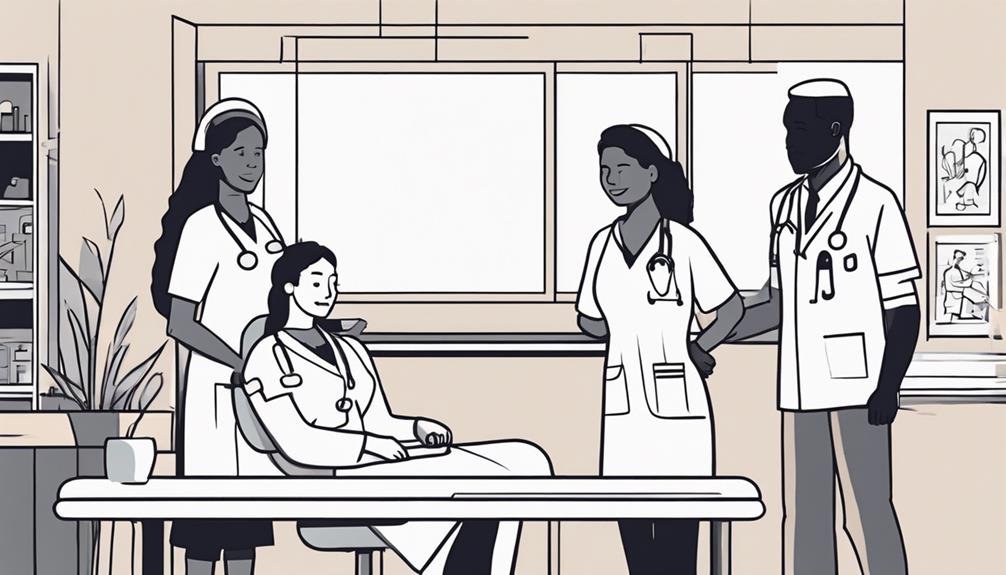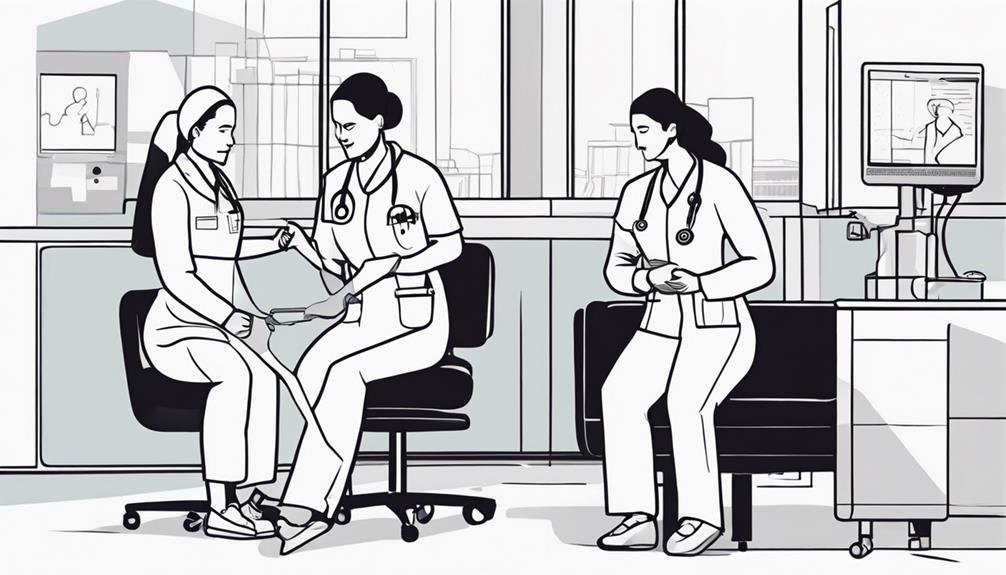To excel as a nurse, you must master key skills for patient care and success in healthcare. Soft skills like effective communication, empathy, time management, and a sense of humor are essential. Hard skills including medication administration, wound care, IV therapy, interpreting lab results, operating medical equipment, and evaluating vital signs are pivotal. In your job search, emphasize these skills on your resume and cover letter. Customize it to highlight critical thinking, communication, empathy, and leadership. By showcasing these skills effectively, you can secure job opportunities and stand out in the field, setting yourself up for success.
Key Takeaways
- Effective communication with patients, families, and healthcare team.
- Proficiency in medication administration and dosage calculations.
- Skilled in wound care management and assessment.
- Competent in interpreting lab results and implementing appropriate interventions.
- Ability to evaluate vital signs and respond to changes promptly.
Soft Skills for Nurses

Soft skills are fundamental for nurses to provide high-quality care and support to their patients. Among the essential skills for nurses, effective communication plays a pivotal role. Studies reveal that 70% of medical errors stem from poor communication. By honing communication skills, nurses can ensure accurate information exchange, leading to better patient outcomes.
Empathy is another crucial skill that nurses must develop. Research indicates that empathy in nursing care can greatly enhance patient satisfaction and overall outcomes. Compassion is equally significant, as studies show that compassionate care increases patient adherence to treatment plans.
Additionally, time management skills are vital for nurses. Efficiently managing time not only reduces stress and burnout but also boosts productivity and patient care. Lastly, maintaining a sense of humor is helpful in fostering positive team dynamics and reducing workplace stress, ultimately contributing to a more supportive and cohesive work environment for nurses.
Hard Skills for Nurses
When it comes to excelling in the field of nursing, honing your hard skills is essential. This includes mastering tasks like medication administration, wound care management, and IV therapy to guarantee the best patient care. Proficiency in clinical competencies and technical skills such as interpreting lab results and operating medical equipment are crucial components of being a skilled and competent nurse.
Clinical Competencies
To excel in the nursing profession, possessing clinical abilities is crucial. These hard skills encompass a range of capabilities essential for providing quality patient care. Nurses must be skilled at medication administration, wound care, and IV therapy. Proficiency in evaluating essential signs, interpreting lab results, and conducting physical examinations are also key components of clinical competencies. Operating medical equipment such as ventilators and cardiac monitors is important for effective patient care in diverse healthcare settings. Additionally, nurses must excel in documentation, accurately charting patient information, and maintaining electronic health records to guarantee continuity of care and patient safety. Continuous education and training play a significant role in enhancing these clinical abilities, keeping nurses updated on the latest practices, procedures, and technologies. By honing these skills, nurses can deliver top-notch care and contribute notably to the well-being of their patients.
Technical Proficiency
Demonstrating technical expertise is a fundamental aspect of nursing practice. As a nurse, mastering technical skills is essential for providing high-quality patient care. Hard skills encompass a range of competencies, including administering medications, operating medical equipment, and performing medical procedures like wound care, IV insertion, and accurate important sign monitoring. Proficiency in utilizing electronic health records (EHR) systems and maintaining precise medical documentation is necessary for ensuring accurate patient records and effective communication among healthcare teams.
Moreover, understanding and interpreting diagnostic tests such as X-rays, lab results, and EKGs are crucial for aiding in diagnosis and treatment. Effective communication with interdisciplinary teams, patients, and families is a key hard skill that nurses must possess to guarantee coordinated care and best treatment outcomes. By honing your technical expertise, you enhance your ability to deliver safe and efficient care while meeting the diverse needs of patients in various healthcare settings.
Nursing Skills in Job Search

When it comes to moving through the job search as a nurse, it's important to strategically emphasize your nursing skills. Make sure your resume features a dedicated skills section that emphasizes your expertise in the field. Customizing your cover letter to showcase relevant nursing skills that align with the job requirements can greatly enhance your chances of securing that desired nursing position.
Job Search Strategies
Crafting a successful job search strategy as a nurse involves showcasing your specialized skills effectively. To increase your chances of landing a job interview, tailor your resume to highlight your nursing skills. When writing your cover letter, be sure to emphasize specific nursing skills that make you a good nurse and showcase how they align with the position you are applying for. During interviews, make a conscious effort to emphasize your key nursing skills to demonstrate your readiness for the job and your commitment to maintaining a healthy work/life balance. Remember to update your resume with relevant nursing skills tailored to each job posting to stand out to potential employers. By focusing on your nursing skills in your job search, you can secure a position that best fits your expertise and experience.
Highlighting Nursing Skills
To effectively highlight your nursing skills in your job search, it is important to tailor your application materials to showcase your expertise and qualifications. Make sure to emphasize critical thinking and good communication skills in your resume and cover letter. Employers value these abilities highly in nursing roles. When preparing for interviews, be ready to discuss how you have applied these skills in previous nursing experiences. Research the specific skills required for the nursing position you are interested in and align your qualifications accordingly. Using industry-specific language and terminology will effectively communicate your nursing skills to potential employers. By highlighting these key skills, you will stand out as a strong candidate in the competitive field of nursing. Remember to showcase your empathy and leadership qualities as well, as these are essential traits that employers look for in nursing professionals.
Resume and Cover Letter
In your pursuit of showcasing your nursing skills effectively throughout the job search process, your resume and cover letter play important roles. When crafting your resume, make sure to tailor it to include key nursing skills such as patient assessment, medication administration, and wound care. Highlight your communication skills in your cover letter, emphasizing your ability to collaborate with multidisciplinary teams and provide patient education. It's essential to showcase your critical thinking skills in both your resume and cover letter, demonstrating your ability to make quick and effective decisions in high-pressure situations. Don't forget to include specific examples of your leadership skills, illustrating your experience in mentoring new staff or leading quality improvement initiatives. Use your application materials to also demonstrate your proficiency in time management, showcasing your ability to prioritize patient care tasks and handle multiple responsibilities efficiently. By following these guidelines, your resume and cover letter will effectively showcase your nursing skills and increase your chances of landing the job you desire.
Resume Format for Nurses
When creating a resume as a nurse, selecting a polished and professional format is crucial in effectively showcasing your nursing skills. Opt for a clean and professional layout, such as a chronological or combination format, to highlight your relevant experience and qualifications. Make sure to include a separate section specifically for your nursing skills to draw attention to your expertise in the field. Tailoring your resume to the job description by emphasizing relevant nursing skills and certifications can greatly increase your chances of landing an interview. Prioritize clarity and readability in your resume design to make sure recruiters can quickly identify your nursing skills amidst other applicants. By choosing a format that emphasizes your nursing skills and experience, you can create a resume that stands out and effectively communicates your qualifications to potential employers.
Updating Your Resume

When updating your resume as a nurse, make sure to include a separate skills section to emphasize your nursing expertise. Tailoring your skills to the job posting can effectively demonstrate how well-suited you are for the position. Integrate your nursing skills throughout your resume to provide a well-rounded view of your qualifications and highlight your communication and critical thinking abilities.
Skill Highlighting Techniques
Highlighting your nursing skills effectively on your resume is essential in showcasing your qualifications and expertise to potential employers. Start by creating a separate skills section where you list key nursing skills such as clinical knowledge, patient assessment, and medication administration. Tailor these skills to align with the job requirements mentioned in the job posting to make a stronger impact. Additionally, integrate your nursing skills into your work history descriptions to demonstrate practical application. Emphasize skills like communication and critical thinking, as they are highly valued in the nursing profession. Stand out as a well-rounded candidate by providing specific examples of how you have utilized your nursing skills in various scenarios. Updating your resume with these highlighting techniques will help you present a detailed overview of your capabilities to potential employers.
Effective Resume Tips
To enhance your chances of making a lasting impression on potential employers, it is vital to update your resume with effective resume tips. Highlighting your specific nursing skills is important to showcasing your expertise and qualifications for the job. Here are some key tips to keep in mind when updating your nursing resume:
| Effective Resume Tips | Description |
|---|---|
| Include a Skills Section | Highlight essential nursing skills such as patient care, critical thinking, and communication. |
| Tailor Skills to Job Requirements | Match your skills to the job posting to align with what the employer is looking for in a candidate. |
| Integrate Skills into Work History | Showcase your expertise by incorporating specific nursing skills into your work experience descriptions. |
Tailoring Your Cover Letter
Crafting a tailored cover letter is a vital step in showcasing your nursing skills effectively. When tailoring your cover letter, be sure to mention specific nursing skills that demonstrate your qualifications for the job. Provide concrete examples of how you have applied these skills successfully in previous roles to give potential employers a clear understanding of your capabilities. Customizing your cover letter for each job application is pivotal as it allows you to highlight the most relevant nursing skills that align with the job requirements.
In your cover letter, focus on showcasing your communication, critical thinking, and patient care skills as these are highly valued in the nursing profession. By tailoring your cover letter to emphasize your nursing skills, you can significantly enhance your chances of landing an interview. Remember, a well-crafted cover letter not only introduces you to the employer but also sets you apart from other applicants by highlighting your unique nursing abilities.
Interview Preparation for Nurses

When preparing for your nursing interview, it's important to focus on showcasing your key skills such as critical thinking, communication, and leadership abilities. Highlight your experience by providing specific examples of how you have utilized these skills in previous nursing roles. Research the organization you are interviewing with to align your responses with their values and mission, demonstrating how you can contribute effectively to their team.
During the nursing interview, be prepared to discuss your flexibility, adaptability, and problem-solving skills. Show how you can handle the challenges of the nursing profession with ease. Additionally, practice talking about your ability to maintain a healthy work-life balance, emphasizing the importance of self-care and stress management in the nursing field.
Healthcare Talent Resources
Within the field of healthcare, the pursuit of enhancing nursing skills and advancing your career often necessitates tapping into various healthcare talent resources. To find the best resources, explore platforms like Indeed for career advice and sample resumes tailored to healthcare professionals. Use job search quick links to discover relevant resources for career development in the healthcare sector. These resources offer a plethora of options to improve your nursing skills, such as specialized courses, certifications, and job search tools.
Staying updated on industry trends and job opportunities is pivotal, and healthcare talent resources provide valuable insights to help you navigate your career path effectively. By accessing these resources, you can find the support and guidance needed to advance in your nursing career. Whether you are seeking to enhance your skills, explore new opportunities, or stay informed about the latest developments in the field, leveraging healthcare talent resources is essential for your professional growth.
Follow the 6 Cs

To excel in the nursing profession, embodying the 6 Cs – Care, Empathy, Proficiency, Communication, Valor, and Dedication – is essential. Here are key points to keep in mind:
- Care: Nurses must provide utmost Attention to patients, ensuring their well-being and safety are the top priorities.
- Empathy: Showing Empathy by treating patients with kindness and respect is crucial for building trust and fostering a positive healing environment.
- Proficiency: Possessing Proficiency in knowledge and skills is vital. It allows nurses to assess and meet patients' needs effectively, ensuring high-quality care delivery.
- Communication: Effective Communication is essential. It enables nurses to listen to patients, collaborate with colleagues, and provide optimal care tailored to individual needs.
Empathy in Nursing
As a nurse, your ability to embody empathy plays a vital role in providing exceptional care to patients. In the current healthcare landscape, showing empathy in nursing is more important than ever. The pandemic has heightened global anxiety and depression by 25%, emphasizing the essential need for nurses to provide best care and show compassion. Empathy in nursing goes beyond just understanding patients' medical conditions; it involves considering various variables that affect their health, such as social determinants and personal circumstances.
To excel in empathetic nursing, you must focus on providing care with compassion, understanding, and sensitivity towards patients' emotional and physical well-being. By acknowledging and addressing the emotional needs of patients, you enhance the quality of care provided, ultimately building trust and improving overall health outcomes. Remember, showing empathy in nursing is not just a skill but a fundamental aspect of delivering holistic and patient-centered care.